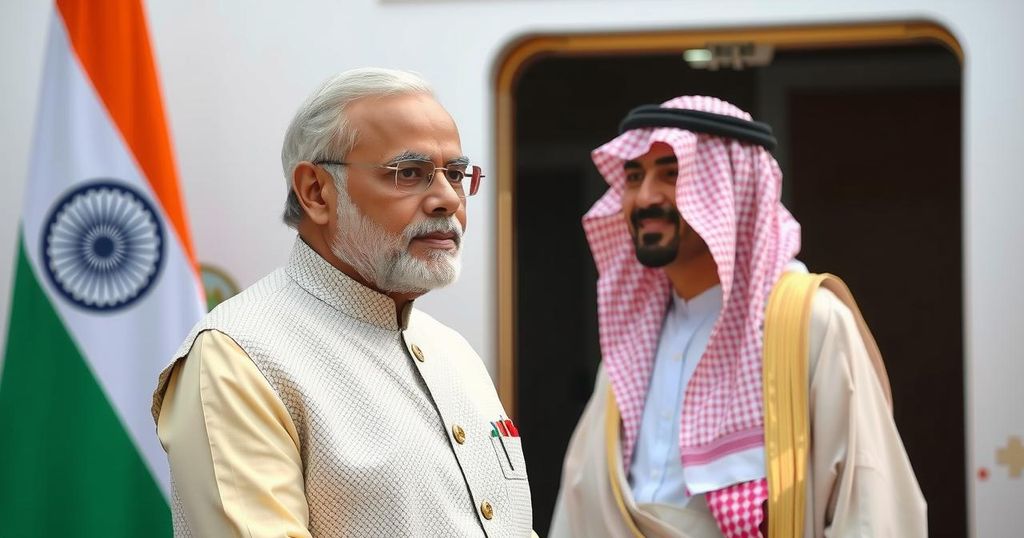PM Modi Commences Historic Visit to Kuwait to Strengthen Bilateral Ties
Prime Minister Narendra Modi is visiting Kuwait for two days, his first visit to the country as India’s Prime Minister in over 40 years. The visit aims to enhance bilateral relations, engage with the Indian community, and discuss key areas such as trade and investment with Kuwaiti leaders. Notable components include meetings with the Amir and Crown Prince, a visit to a labor camp, and participation in the Gulf Cup tournament opening.
Prime Minister Narendra Modi commenced his two-day visit to Kuwait, marking the first visit by an Indian Prime Minister in over 40 years. This historic visit aims to strengthen bilateral relations between India and Kuwait, which have been traditionally robust but are expected to expand into new areas. During the visit, Prime Minister Modi will engage with Kuwait’s leadership, including the Amir, Sheikh Meshal Al-Ahmad Al-Jaber Al-Sabah, the Crown Prince, and the Prime Minister, focusing on enhancing cooperation in trade, investment, energy, and cultural exchange.
Furthermore, Prime Minister Modi is set to interact with the sizeable Indian community in Kuwait, conduct an on-site visit to a facility housing Indian blue-collar workers, and attend the opening ceremony of the Gulf Cup football tournament. The Indian community, which stands as the largest expatriate group in Kuwait, will be a focal point during his visit, underlined by the ‘Hala Modi’ community event at Sheikh Saad Al Abdullah Sports Complex.
The Ministry of External Affairs anticipates this visit will “open a new chapter” in India-Kuwait relations. Discussions are reportedly underway regarding a bilateral investment treaty and a defense cooperation agreement, which signify steps towards greater collaboration. Moreover, the visit is expected to enhance ties between India and the Gulf Cooperation Council (GCC), of which Kuwait currently holds the chairmanship. The GCC encompasses key economic players, further emphasizing the strategic importance of this visit.
Trade relations between India and Kuwait are robust; India ranks among Kuwait’s top trading partners, with total bilateral trade recorded at USD 10.47 billion for 2023-24. Indian exports have experienced a significant increase, growing from $1.56 billion to $2.1 billion within the span of one fiscal year. Additionally, Kuwait is a critical supplier of crude oil for India, fulfilling 3% of its energy requirements, while Kuwait Investment Authority’s investments in India exceed USD 10 billion, showcasing the strong economic ties between the two nations.
Prime Minister Modi’s visit to Kuwait is significant as it represents the first such engagement by an Indian Prime Minister in 43 years. The last visit was made by Indira Gandhi in 1981, reflecting the long gap in high-level exchanges. Modi’s trip comes at a time of heightened interest in revitalizing bilateral relations, encompassing various spheres including economic cooperation, labor rights, and cultural exchanges. Kuwait hosts a considerable Indian diaspora, making community interaction an essential part of this visit, aligning with broader diplomatic goals in the region. The GCC’s role as an influential economic group further highlights the strategic importance of strengthening relationships with member states.
In summary, Prime Minister Narendra Modi’s two-day visit to Kuwait symbolizes a turning point in India-Kuwait relations, aiming to bolster existing partnerships while exploring new avenues for collaboration. Focused on trade, investment, and cultural ties, the visit may also enhance India’s engagement with the GCC. With substantial trade volumes and a significant expatriate community in Kuwait, this mission holds promise for future development and mutual benefit.
Original Source: www.hindustantimes.com




Post Comment